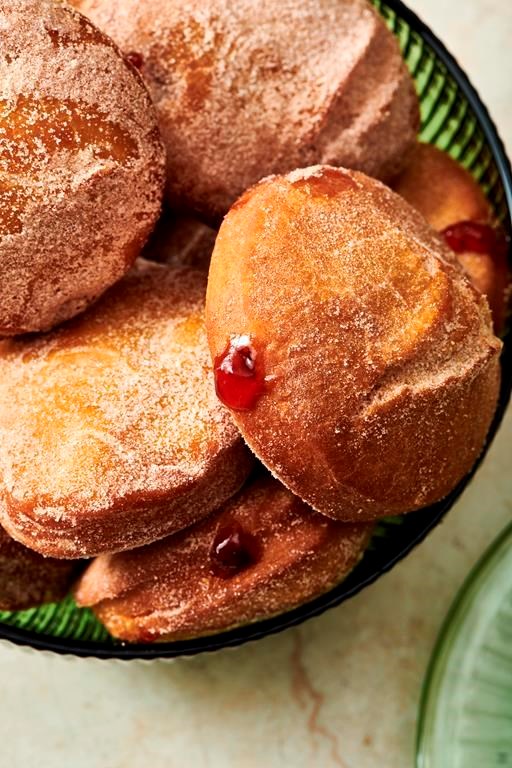Jelly doughnuts, also known as sufganiyot, have become a classic Hanukkah treat, one of a number of foods fried in oil that are popular on the holiday ( , are another).
They’re doughnuts without a central hole, fried and stuffed with jelly or jam. In Israel, jelly doughnuts for Hanukkah are especially popular, and are sometimes filled with chocolate or halvah too. They also can be prepared in savory versions, stuffed with meat or vegetables.
The story goes that over 2,000 years ago, after the Second Temple of Jerusalem was ransacked by invaders, there was only enough oil to keep the temple candles lit for one day and night. Inexplicably, the oil burned for eight days and eight nights, a feat now celebrated as Hanukkah, the eight-day “festival of lights.” (This year, Hanukkah begins on Sunday evening, Dec. 18.)
There are two ways to fill jelly doughnuts. You can fill them before frying (the jelly is sandwiched between two disks of yeast dough, sealed and fried). Or you can fry them first and then inject them with filling, which is what I do here. This technique removes the risk of not-properly-sealed doughnuts coming apart in the pan and leaking their filling.
The traditional yeast dough used to make doughnuts requires two risings, one for the ball of dough itself and the other for the shaped doughnuts before they are fried. Both risings are necessary for light and fluffy doughnuts.
You can use any type of jam you like; strawberry and raspberry jelly are popular.
JELLY DOUGHNUTS
Serves 16
1 (.25-ounce) package active dry yeast or 1 tablespoon dry yeast
¾ cup warm milk (about 100° F)
¼ cup melted butter
¼ teaspoon kosher salt
1/2 cup sugar
1 large egg and 1 egg yolk, lightly beaten
2 1/2 to 3 cups all-purpose flour, divided
¼ teaspoon ground nutmeg, mace or cinnamon
Vegetable oil for frying
¾ cup jam or jelly, any flavor
For the Coating:
1 cup sugar
1 teaspoon ground cinnamon
Generously flour a clean work surface and lightly oil a medium-size bowl.
In a large bowl or the bowl of a standing mixer, add the warm milk, then sprinkle the yeast over the milk. Using an electric mixer, or the dough hook for a standing mixer, stir to dissolve and allow it to sit until it gets foamy, about 10 minutes. Add the butter, salt and sugar, and stir or blend to combine. Blend in the egg and egg yolk, then beat in 2 cups of the flour. Beat until the dough starts to pull away from the sides of the bowl, then beat in another 1/2 cup of the remaining flour plus the nutmeg, mace or cinnamon.
When the batter has formed into a cohesive ball, turn it onto the floured work surface and knead the dough for two minutes. Add more flour as needed if the dough feels too sticky. Form the dough into a ball, and place in the oiled bowl. Cover with a dishtowel or plastic wrap and let sit in a warm, draft-free place until the dough has doubled in volume, about 1 hour.
Clean and re-flour your work surface. Turn the dough onto the floured surface and roll it out with a floured rolling pin to a 1/2-inch thickness.
With a 3-inch biscuit or cookie cutter, cut as many rounds as you can, minimizing the space between each round. Gather the scraps, let them sit for another 15 minutes, then roll the dough out again, and cut as many more circles as possible. Place the circles on a very lightly floured baking sheet with a couple of inches between each doughnut, cover with a clean dishtowel or loose plastic wrap, and let sit for about 1 hour, until they are quite puffy, about 1 inch thick.
About 15 minutes before you are going to fry the doughnuts, place paper towels on a clean surface. Make the sugar coating: In a shallow bowl, mix together the 1 cup sugar with the cinnamon. And pour at least 2 inches of oil into a deep skillet or pan. Heat to 375° F over medium heat.
Use a spatula to transfer two or three doughnuts into the pan. They will rise and bob on the surface; fry for about 1 minute, until golden brown on the underside, then flip them and cook until the second side is golden brown, another 1 to 2 minutes. You can occasionally gently press the doughnuts down into the oil to cook the sides evenly. Remove the doughnuts, allowing excess oil to drain back into the pan, and let them rest for a minute on the paper towels.
Then place them in the bowl with the sugar coating and turn to coat completely.
Use a chopstick or wooden dowel to poke a hole into the side of each doughnut, and as you slide it in, give it a wiggle to create a small pocket in the center of the doughnut. Fill a pastry bag or sturdy plastic bag with the jelly. If you are using a plastic bag, cut a very small triangle from one of its bottom corners. Insert the pastry bag or snipped corner of the plastic bag into the hole on the side of the doughnut. Gently squeeze a couple of teaspoons of jelly into the middle of the doughnut. Remove the bag carefully from the doughnut, and repeat until all the doughnuts are filled.
Serve warm or at room temperature.
—-
Katie Workman writes regularly about food for The Associated Press. She has written two cookbooks focused on family-friendly cooking, “Dinner Solved!” and “The Mom 100 Cookbook.” She blogs at . She can be reached at [email protected].
—-
For more AP food stories, go to
Katie Workman, The Associated Press

